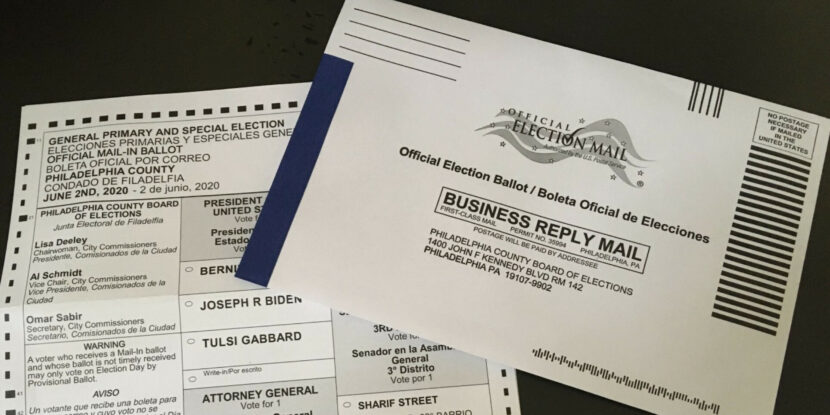Evidence from countries that use mail-in – or postal – votes points to “widespread abuse” as Democrats in the United States seek to expand the process, piggybacking off the coronavirus pandemic to deliver on their goal of a less secure election.
Speaker Nancy Pelosi signaled her intent in April: “Vote by mail is so important to… our democracy so that people have access to voting and not be deterred, especially at this time, by the admonition to stay home.”
But while malls, cinemas, and restaurants begin to re-open, Americans are increasingly curious as to the keenness of Democrats to get people to vote by mail.
As of August, at least three-quarters of Americans were eligible to vote by mail in some form. President Trump recently cited the New York Times’ number of 80 million ballots which will “flood election offices this fall, more than double the number that were returned in 2016.”
That’s an unsettling number, given America’s relative inexperience with the process.
Other nations have tried mail-in or postal voting for years, with almost none of the developed countries that use it allowed such widespread usage.
POLAND AND THE EUROPEAN UNION.
In early 2020, the conservative government in Poland wanted to use mail-in ballots but was rebuked by the European Union for suggesting as much.
“I followed this process very closely. I’m concerned about free and fair elections and the quality of voting, of the legality and constitutionality of such a vote,” EU Values and Transparency Commissioner Vera Jourova told Polish daily Rzeczpospolita in April.
In fact recommendations by the Council of Europe encourage no rules changes in elections one year before those elections are set to take place.
“Postal voting is a huge change and such a method is being used for the first time, people aren’t used to it,” Jourova said.
And while Poland may be the most evident comparison from 2020, postal voting has been the subject of controversy for many decades.
UNITED KINGDOM.
America’s mother country, the United Kingdom, has struggled to get a handle on postal voting since it was first introduced, en masse, in 2001.
In 2006 the Council of Europe opened an investigation into allegations of “widespread absent vote fraud,” particularly on the back of a Birmingham (UK) judge declaring that he had heard evidence of fraud that “would disgrace a banana republic.”
Later that year, politicians from the Liberal Democrat Party were found guilty of postal vote rigging, while fraudulent activity had been reported in London, Coventry, Bradford, Northern Ireland, and beyond.
In one instance, 30,000 names were removed from the ballot in just one British city after major fraud was alleged.
A leading UK charity published a report authored by Dr. Stuart Wilks-Heeg of the University of Liverpool in 2008. It said: “Greater use of postal voting has made UK elections far more vulnerable to fraud and resulted in several instances of large-scale fraud.”
The Council of Europe’s own report found, that same year:
Entire Parliamentary research papers have been written on the subject, with the 2010 report beginning: “There have been many allegations of electoral abuse since the introduction of postal voting on demand in 2001.”
In 2016 the government’s anti-corruption champion, Sir Eric Pickles, issued a 65-page review into electoral fraud in the United Kingdom with no fewer than 144 references to postal voting.
Secrecy of the ballot was one of Sir Eric’s critical concerns, and he noted that members of ethnic minorities were especially at risk:
Member of Parliament Steve Baker wrote in furtherance of this in 2019: “My constituents would be shocked if they knew the extent of corrupt election practices and voter fraud, if we fail to understand the magnitude of this, then we are a politically bankrupt nation.”
He elaborated:
There is widespread abuse of postal votes. In one case, private data held by a third party for legitimate purposes was used to apply for postal votes, and then intercepted before electors had a chance to complete them. The victims would not make a formal complaint as they feared retribution.
I have received accounts of candidates visiting electors’ homes, demanding postal votes are completed in front of them, and then taking them away. I have testimony of one young woman’s unmarked postal vote being taken off her under duress by a relative and handed to a candidate. We learned about it because she wanted to cancel her postal vote so she could cast it again herself.
We cannot assume voters enjoy secrecy and freedom when marking a ballot paper at home. Only last week my agent reported to the Police evidence of the harvesting of postal votes.
And while the left-leaning Vox website calls mail-in ballot fraud concerns a “conspiracy theory,” and urges “Democrats to secure that policy… [and] make it non-negotiable bottom line — a condition of voting through any further stimulus bills,” the use (or lack-thereof) from other nations proves otherwise.
According to the U.S.-based Crime Prevention Research Center: “Among the 27 countries in the European Union, 63 percent ban mail-in voting unless living abroad and another 22 percent require a photo ID to obtain a mail-in ballot. Twenty-two percent ban the practice even for those who live abroad.”
“There are 16 countries in the rest of Europe, and they are even more restrictive. Every single one bans mail-in voting for those living in the country or require a photo ID to obtain a mail-in ballot. Sixty-three percent don’t allow mail-in ballots even for citizens living outside of the country.”
By this point it’s clear that Americans on the right need to take as much advantage of the mail-in voting process to ensure their votes are cast. That nothing, as President Trump said, should stop voters from ensuring their vote is cast.
“Send it in early, and then go in and vote… and if it doesn’t tabulate, you vote… you can’t let them take your vote away.”


